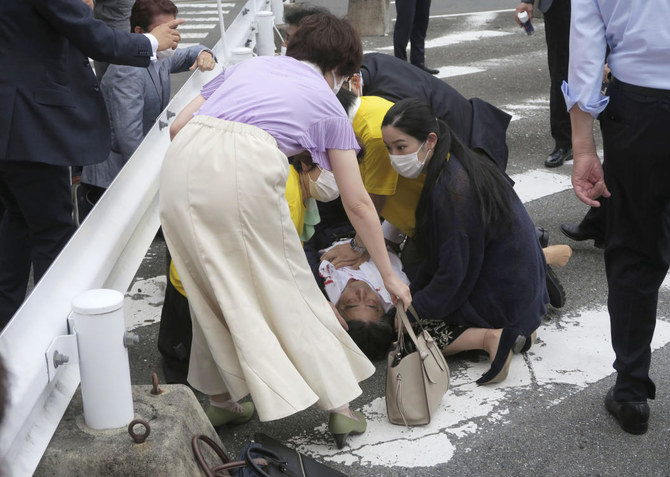NARA, Japan: Former Prime Minister Shinzo Abe, Japan’s longest-serving leader, died on Friday after being shot while campaigning for a parliamentary election, public broadcaster NHK said.
A man opened fire on Abe, 67, from behind with an apparently homemade gun as he spoke at a drab traffic island in the western city of Nara, Japanese media showed earlier.
It was the first assassination of a sitting or former Japanese premier since the days of prewar militarism in the 1930s.
Speaking before Abe’s death was announced, Prime Minister Fumio Kishida condemned the shooting in the “strongest terms” while Japanese people and world leaders expressed shock at the violence in a country in which political violence is rare and guns are tightly controlled.
“This attack is an act of brutality that happened during the elections — the very foundation of our democracy — and is absolutely unforgivable,” said Kishida, struggling to keep his emotions in check.
A fire department official had said Abe appeared to be in a state of cardiac arrest when airlifted to hospital.
#WATCH: Seconds after #Japan’s former PM #AbeShinzo was shot. People can be heard screaming and crying. Abe’s condition is still unknown pic.twitter.com/L8sXZntBEI
— Arab News Japan (@ArabNewsjp) July 8, 2022
Police said a 41-year-old man suspected of carrying out the shooting had been arrested. NHK quoted the suspect, identified as Tetsuya Yamagami, as telling police he was dissatisfied with Abe and wanted to kill him.
Abe was making a campaign speech outside a train station when two shots rang out at about 11:30 a.m. (0230 GMT). Security officials were then seen tackling a man in a grey T-shirt and beige trousers.
“There was a loud bang and then smoke,” businessman Makoto Ichikawa, who was at the scene, told Reuters, adding that the gun was the size of a television camera.
“The first shot, no one knew what was going on, but after the second shot, what looked like special police tackled him.”
The thoughts and prayers of Jordan’s Government and people are with Japan’s former Prime Minister ABE Shinzo, his family and the people of Japan.
We are saddened by the shooting of former PM ABE, an outstanding world leader and friend of Jordan. WE PRAY FOR HIS WELL-BEING— Embassy Of Jordan Japan (@JoEmbassyJPN) July 8, 2022
Earlier, Kyodo news service published a photograph of Abe lying face-up on the street by a guardrail, blood on his white shirt. People were crowded around him, one administering heart massage.
Nara emergency services said he had been wounded on the right side of his neck and left clavicle. His brother, Defense Minister Nobuo Kishi, had said Abe was getting blood transfusions.
NHK showed live footage of Abe’s wife, Akie, on her way by train to the hospital where he was being treated.
Airo Hino, political science professor at Waseda University, said such a shooting was unprecedented in Japan. “There has never been anything like this,” he said.
We are all saddened and shocked by the shooting of former Prime Minister Abe Shinzo. Abe-san has been an outstanding leader of Japan and unwavering ally of the U.S. The U.S. Government and American people are praying for the well-being of Abe-san, his family, & people of Japan.
— ラーム・エマニュエル駐日米国大使 (@USAmbJapan) July 8, 2022
Senior Japanese politicians are accompanied by armed security agents but often get close to the public, especially during political campaigns when they make roadside speeches and shake hands with passersby.
In 2007, the mayor of Nagasaki was shot and killed by a yakuza gangster. The head of the Japan Socialist Party was assassinated during a speech in 1960 by a right-wing youth with a samurai short sword. A few other prominent postwar politicians were attacked but not injured.
Police said the suspected shooter was a resident of Nara. Media said he had served in Japan’s military for three years until 2005. Defense Minister Kishi declined to comment on that.
Abe served two terms as prime minister, stepping down in 2020 citing ill health. But he has remained a dominant presence over the ruling Liberal Democratic Party (LDP), controlling one of its major factions.
Kishida, Abe’s protege, had been hoping to use the election to emerge from Abe’s shadow and define his premiership, analysts have said. Kishida suspended his election campaign after the shooting. All main political parties condemned the attack.






























